Peking University, December 30, 2020: The Sub-Forum on COVID-19 Shock to Global Health and Development and PKU Institute for Global Health and Development Launching Ceremony were held at Peking University on December 12, with bilingual live broadcasts. The event, a sub-forum of Beijing Forum 2020, brought together outstanding scholars and experts from China and abroad in the fields of health, economics, international relations and so on to discuss in depth how to promote global health and development in the context of the pandemic.
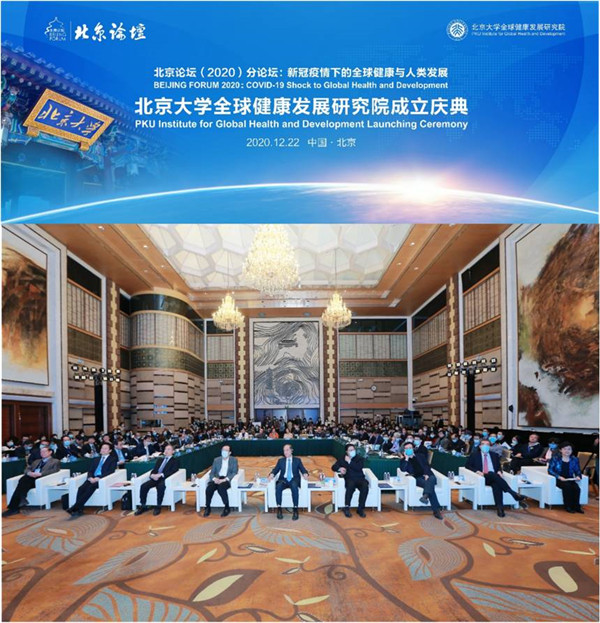
The PKU Institute for Global Health and Development (PKU-iGHD) Launching Ceremony was presided over by Qiao Jie,executive vice president of Peking University Health Science Center, president of Peking University Third Hospital and member of Chinese Academy of Engineering.
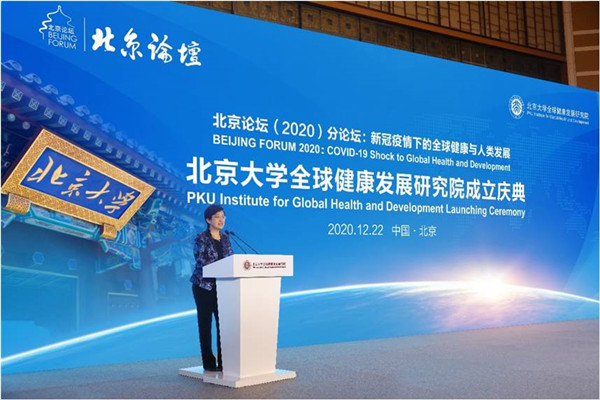
Qiao Jie
Zhan Qimin, executive vice president of Peking University and member of Chinese Academy of Engineering, announced the establishment of PKU-iGHD. Several distinguished guests presented at the event and extended warm congratulations to the establishment of the PKU-iGHD.
Han Qide, co-chair of the Advisory Council for PKU-iGHD, vice chairman of the 10th and 11th Standing Committee of NPC, and honorary president of the Chinese Association for Science and Technology, Qiu Shuiping, chair of Peking University Council, and Hao Ping, president of Peking University, attended the ceremony and presented letters of appointment to PKU-iGHD leaders.
The PKU-iGHD was initiated on May 4, 2020, when Peking University was celebrating its 122nd anniversary. The outbreak of COVID-19 pandemic in the world has brought serious threats to human life and health, and severe challenges to global health and safety, which impose higher requirements for national governance system and global health governance ability. China, as an important participant, builder and contributor to the change of global governance system, has the responsibility and obligation to contribute to the strengthening of global health discipline construction and talent training, and the enhancement of the capacity building of global health institutions. The PKU-iGHD aims to mobilize the resources of PKU’s humanities and social sciences disciplines including public health, clinical medicine, economics, international relations, etc., and to create a high-end research institution to meet the challenges of global health and human development. It is not only an urgent need under the situation of the COVID-19 pandemic, but also an important requirement of Peking University to promote the construction of "double first-class" university as a whole. Its establishment has unprecedented timeliness, far-reaching significance and importance.
The event was reported by many media and platforms, such as CCTV, Xinhua News Agency, People's Daily, Guangming Daily, China Education Network Television, Beijing TV, Beijing Daily, The Paper, China Science Daily, NetEase, Sina, Phoenix, Sohu, etc.
Launching Ceremony
Zhan Qimin announced the establishment of PKU-iGHD. He said that in the context of the global spread of the COVID-19 pandemic, Peking University decided to set up the PKU-iGHD. The aim is to better integrate our discipline resources in public health, economic management, international relations and other related fields, and to shoulder the responsibility of making contribution for a global community of health for all.
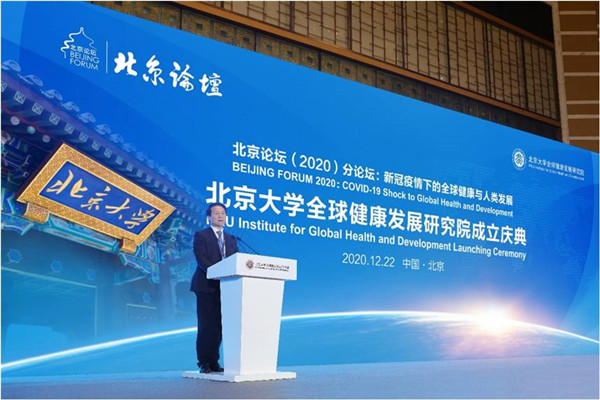
Zhan Qimin
Chen Zhu, vice chairman of the NPC Standing Committee, former minister of Health of China and member of Chinese Academy of Sciences, expressed his view that in the context of globalization and national development, the establishment of PKU-iGHD is an important step for Peking University to train high-level talents who would be future leaders for research in global health and international governance. This is also a demonstration of Peking University’s vision to be a world-class university.
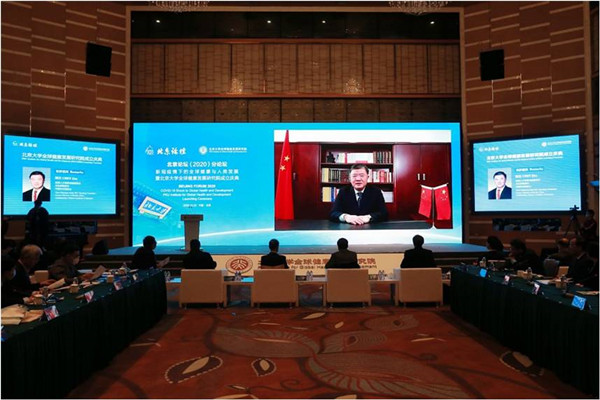
Chen Zhu
Han Qide praised the establishment of PKU-iGHD to be comply with the Chinese old saying of “right timing, favorable location and harmonious people”. He hopes PKU-iGHD will be a flagship hub organization, which can make full use of the advantages of Peking University’s intellectual resources in all aspects, and to contribute to the advancement of human health and global development.
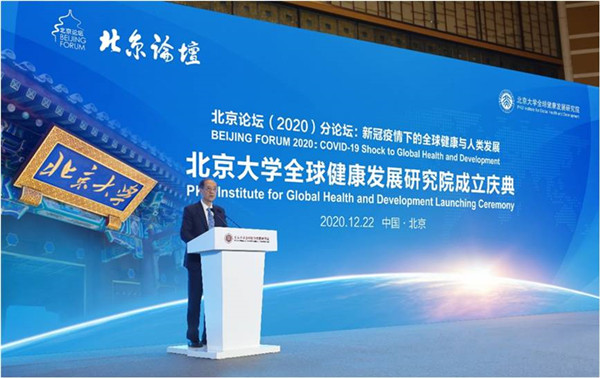
Han Qide
William Hsiao, co-chair of the Advisory Council for PKU-iGHD, K.T. Li Professor of Economics Emeritus of Harvard School of Public Health, and member of the US National Academy of Medicine, emphasized that with the advantages of Peking University and China, PKU-iGHD should be an interdisciplinary research institute focusing on health and development. It should take international cooperation as the premise, and build on three intellectual pillars: economics, public health, and international relations, and will be playing a major and leading role in the world.
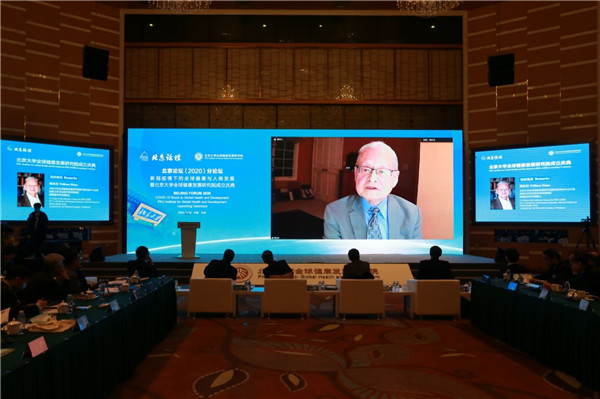
William Hsiao
Ren Minghui, assistant director-general of WHO, sent his sincere greetings through video. He emphasized that global health is an important agenda of global development and it requires global cooperation. WHO holds the concept that enjoying health is a basic right for everyone and WHO has great expectation for future partnership with PKU-iGHD for the global health development.
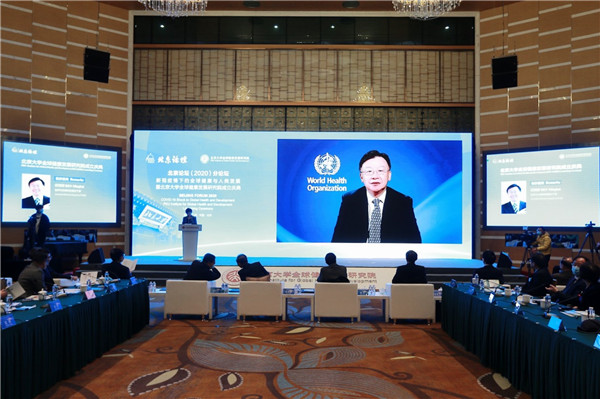
Ren Minghui
Mark McClellan, Robert J. Margolis professor of Business, Medicine, and Policy of Duke University and former commissioner of FDA of the USA, called for global cooperation in policy and technology to reduce the adverse effects of the current and future pandemic and expected PKU-iGHD to contribute more effective ideas to promoting global cooperation.
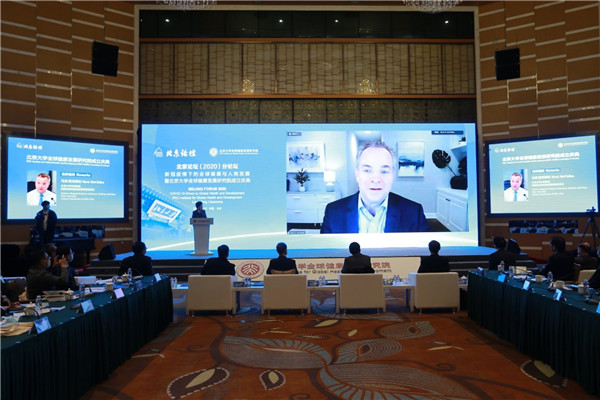
Mark McClellan
Christopher JL Murray, professor and chair of Health Metrics Sciences, director of Institute for Health Metrics and Evaluation of University of Washington, put forward five aspects about how he thinks COVID-19 will change global health in the coming years, such as the way how the global community thinks of the pandemic preparedness, increased focus on non-communicable diseases, etc. He reminded that we should be prepared for the future and give consideration to broader implications, e.g. the economic effects.
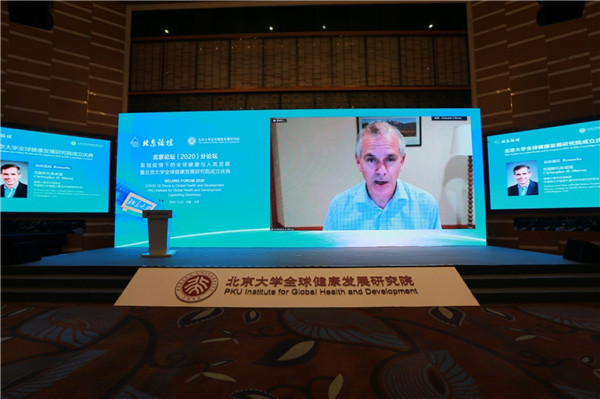
Christopher JL Murray
Margaret Chan, dean of Tsinghua University Vanke School of Public Health and former director-general of WHO, expressed her expectation that PKU-iGHD will promote China to play a greater role in the global healthy development. As the inaugural dean of the Tsinghua University Vanke School of Public Health, she looks forward to very close cooperation with PKU-iGHD and other universities at home and abroad, and to have long-term investment in education and training of new talents and future leaders in health and development.
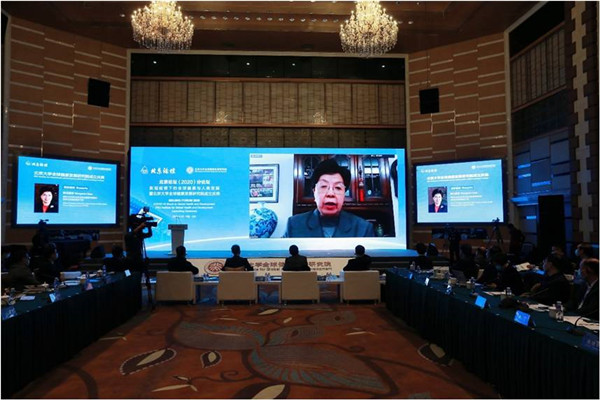
Margaret Chan
Gordon Liu, dean of PKU-iGHD, Boya distinguished professor of Economics in PKU National School of Development, and member of China State Council Health Reform Advisory Commission, made a speech as the inaugural dean of PKU-iGHD. He said that this role is of great responsibility, and he believes that the launching of PKU-iGHD is the action taken by the PKU scholars to promote the construction of a community with a shared future for mankind. The future development of PKU-iGHD should rely on the existing interdisciplinary disciplines of Peking University, and PKU-iGHD will constantly improve the research strength and global vision of the research team and make greater contribution to the healthy development of humans with the wisdom of Chinese scholars. He also extended his gratefulness to the invited speakers and guests for their long-term support and cooperation.
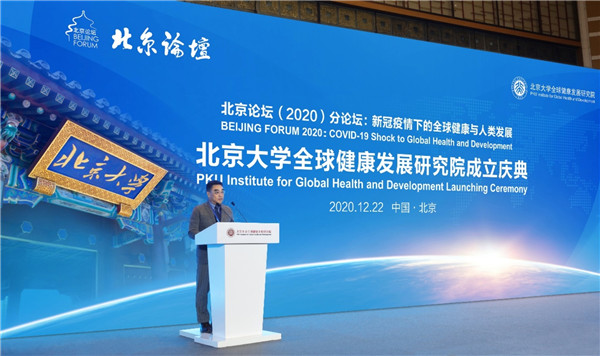
Gordon Liu
After the speeches, Han Qide, Qiu Shuiping, and Hao Ping, presented letters of appointment to PKU-iGHD leaders: Gordon Liu as the dean, Zhan Qimin as the chairman of the Council, and Zhang Haibin and Qin Xuezheng as associate deans.
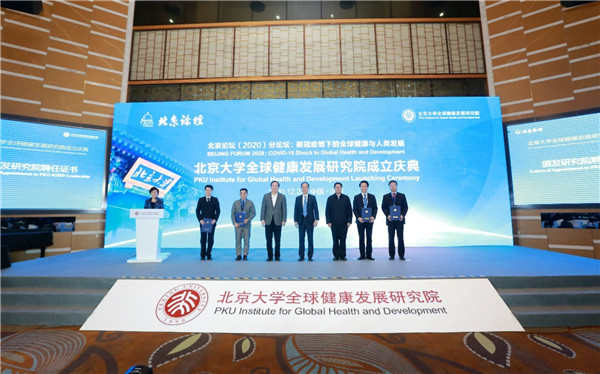
Global Health and Development Forum:Keynote Speeches
The next session of the event is the Global Health and Development Forum, which included keynote speeches by seven top scholars and experts from home and abroad. The moderator is Professor Qin Xuezheng, associate dean of PKU-iGHD and associate dean of PKU School of Economics.
The first speaker is Justin Yifu Lin, dean of PKU Institute of New Structural Economics, dean of PKU Institute of South-South Cooperation and Development, and honorary dean of PKU National School of Development. From the perspective of new structural economics, he elaborated that to achieve a good health system, a country should have economic development to raise the income of the people, and the market and the government should work together to make healthcare available and affordable to the people.
The second speaker is Lawrence H. Summers, who is the president emeritus of Harvard University and former US treasury secretary. He called for global cooperation at the government level, and suggested a goal of vaccination universally available by the end of 2022. He also emphasized that there should be a common global commitment to restore convergence between developing and developed countries, and the establishment of an effective global capacity to meet the next pandemic. He said, “There is no more important act – as history will judge it – than China and the US cooperating together to meet this challenge.”
Victor Dzau, president of US National Academy of Medicine, and former chancellor for Health Affairs of Duke University, emphasized that COVID-19 has demonstrated the importance of responsible leadership, engaged citizenship, agile systems and sustained investment. Multilateralism is the essential linkage at the center and global solidarity and equity are needed for all.
Jeffrey D. Sachs is professor of Columbia University and director of UN Sustainable Development Solutions. He laid out reasons for the superior performance of Asia Pacific countries in tackling COVID-19, and clarified on future priorities for 2021, which include comprehensive application of non-pharmaceutical interventions (NPI), scale up and equitable distribution of vaccines, support for low-and middle-income countries, etc. He pointed out that China has special opportunities in playing the leadership role in the global combat against the pandemic.
George F. Gao, director-general of China Center for Disease Control and Prevention and member of Chinese Academy of Science, shared China's experience in fighting against the COVID-19 pandemic, and China's participation in the global health system. He proposed four principles of global collaboration on public health: cooperation, competition, communication and coordination.
Steve Orlins is president of National Committee on US-China Relations. He made it clear that the future of US China relations will be determined by the people of each country. He hoped the pandemic could become a teaching moment for people to realize that only cooperation between the two countries can confront all the current and future global threats. He hopes PKU-iGHD can help facilitate the dialogue and cooperation in terms of health to the people of China and the US, and the people of the rest of the world can enjoy a healthy and bright future.
Dean Jamison, emeritus professor of Institute for Global Health Sciences of UCSF and principal investigator of Disease Control Priorities Network of the US, emphasized that speed can change the trend of the pandemic and will have a long-term impact. Rapid, collective and scientific response to the current and future pandemic is essential, and global cooperation and exchange should be strengthened.
Global Health and Development Forum:Roundtable Discussions
The roundtable discussions were presided over by Fu Jun, academic dean of the Institute of South-South Cooperation and Development, Peking University. Top scholars and experts from the fields of public health, economics, management, population and environment shared their views and comments of the establishment of PKU-iGHD and the previous speeches.
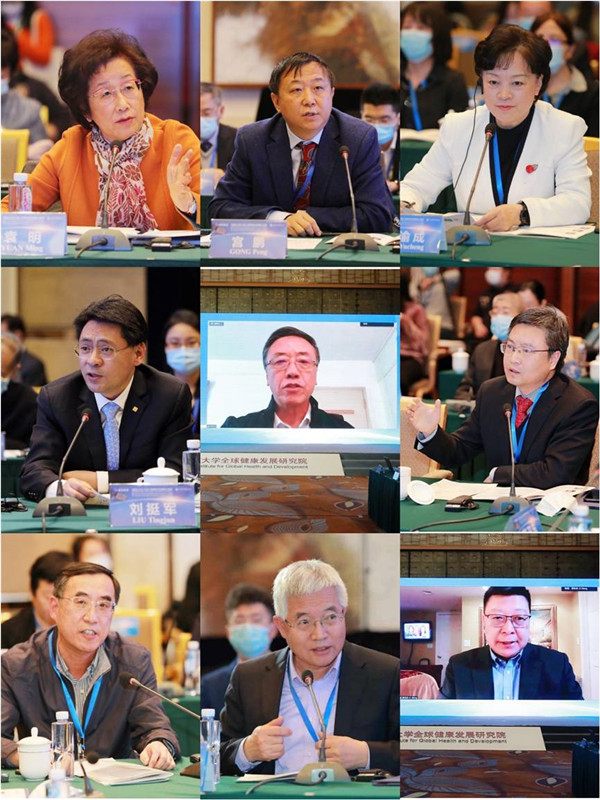
Commentators participating in the discussions included Gong Peng, vice president of the University of Hong Kong and dean of Tsinghua School of Science, Guo Yucheng, president of Chinese Health Association, Han Tieru, president of Chinese Society of Global Health, Chinese Preventive Medicine Association, Liu Tingjun, president of Taikang Insurance Group, Meng Qingyue, dean of Peking University School of Public Health, Yuan Ming, dean of Yenching Academy of Peking University, Zhang Haibin, associate dean of PKU-iGHD, Zhang Weiying, boya distinguished professor of PKU National School of Development, and Zheng Zhijie, associate dean of PKU-iGHD.
Held annually since 2004, co-organized by Peking University, Beijing Municipal Education Commission, and Chey Institute for Advanced Studies, the Beijing Forum, with the overarching theme of “The Harmony of Civilizations and Prosperity for All”, has gathered a wealth of invaluable suggestions and insights that have helped generate outstanding academic advancement in the Asia Pacific region and around the world.